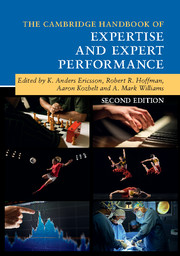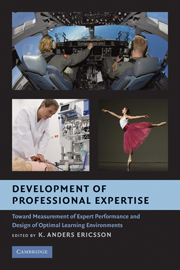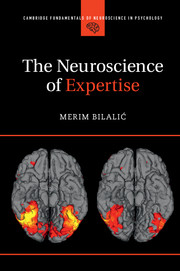The Cambridge Handbook of Expertise and Expert Performance
In this updated and expanded edition of The Cambridge Handbook of Expertise and Expert Performance, some of the world's foremost experts on expertise share their scientific knowledge of expertise and expert performance and show how experts may differ from non-experts in terms of development, training, reasoning, knowledge, and social support. The book reviews innovative methods for measuring experts' knowledge and performance in relevant tasks. Sixteen major domains of expertise are covered, including sports, music, medicine, business, writing, and drawing, with leading researchers summarizing their knowledge about the structure and acquisition of expert skills and knowledge, and discussing future prospects. General issues that cut across most domains are reviewed in chapters on various aspects of expertise, such as general and practical intelligence, differences in brain activity, self-regulated learning, deliberate practice, aging, knowledge management, and creativity.
- The revised handbook will remain the primary source for anyone wanting to get an updated review of the current knowledge, by providing a comprehensive review of the current knowledge about expertise in all major domains
- This book is for anyone interested in studying expert performance and expertise in their own domain of expertise, with its up-to-date knowledge of methods and concepts spanning forty areas
- Any individual interested in improving their own or their employees' performance will find in this book detailed analysis of training methods for improving performance in all major domains of expertise
Reviews & endorsements
'The pursuit of expertise is of course as old as humankind. There have been many breakthroughs but also many false starts, dead ends, and outright errors. It is only now - finally! - that the pursuit of expertise is getting the treatment it deserved all along, and this Cambridge Handbook is the definitive compendium of that treatment: empirical, thoughtful, and exceedingly useful. The new ideas and insights in this revised and expanded edition are particularly welcome, as the world of expertise has changed a lot in the past ten years!' Stephen J. Dubner, host of Freakonomics Radio and co-author of the Freakonomics book series
'The pursuit of expertise is of course as old as humankind. There have been many breakthroughs but also many false starts, dead ends, and outright errors. It is only now - finally! - that the pursuit of expertise is getting the treatment it deserved all along, and this Cambridge Handbook is the definitive compendium of that treatment: empirical, thoughtful, and exceedingly useful. The new ideas and insights in this revised and expanded edition are particularly welcome, as the world of expertise has changed a lot in the past ten years!' Stephen J. Dubner, host of Freakonomics Radio and co-author of the Freakonomics book series
'The second edition of this Handbook reflects the voluminous scholarship on expertise since publication of the first edition, while retaining its positive features. The 42 chapters by leading experts provide a magnificent overview of diverse facets of expertise. Anyone interested in the subject will want to own this volume.' Henry L. Roediger, III, James S. McDonnell Distinguished University Professor, Washington University, St. Louis
'Expertise is a multifaceted phenomenon. And this volume mobilizes an interdisciplinary team of world-class scholars to craft just the right lenses for bringing the unifying themes into focus. Odd though it sounds, it is possible to be an expert on expertise.' Philip E. Tetlock, Annenberg University Professor, University of Pennsylvania and author of Expert Political Judgment: How Good Is It? How Can We Know?
'A truly remarkable achievement, from the original expert on expertise: a deep, wide, and impressively complete look at the science of human excellence. If you’re interested in understanding what creates great performance, you will find no better resource than this book.' Dan Coyle, author of The Talent Code and The Culture Code
Product details
May 2018Paperback
9781316502617
984 pages
247 × 174 × 43 mm
1.59kg
75 b/w illus. 15 tables
Available
Table of Contents
- Part I. Introduction and Perspectives:
- 1. An introduction to the 2nd Edition of the Cambridge Handbook of Expertise and Expert Performance: its development, organization, and content
- 2. A sociological/philosophical perspective on expertise: the acquisition of expertise through socialization
- 3. Re-framing expertise and its development: a lifeworld perspective
- 4. The evolution of expertise
- 5. Expertise in other non-human animals: canines as an example
- Part II. Overview of Approaches to the Study of Expertise: Brief Historical Accounts of Theories and Methods
- 6. Studies of expertise from psychological perspectives: historical foundations and recurrent themes
- 7. Expert systems: a perspective from computer science
- 8. Developing occupational expertise through everyday work activities and interactions
- 9. Professionalism, science, and expert roles: a social perspective
- Part III. Methods for Studying the Structure of Expertise:
- 10. Perception in expertise
- 11. Eliciting and representing the knowledge of experts
- 12. Capturing expert thought with protocol analysis: concurrent verbalizations of thinking during experts' performance on representative tasks
- 13. Methods for studying the structure of expertise: psychometric approaches
- 14. Studies of the activation and structural changes of the brain associated with expertise
- Part IV. Methods for Studying the Acquisition and Maintenance of Expertise:
- 15. Collecting and assessing practice activity data: concurrent, retrospective and longitudinal approaches
- 16. Multidisciplinary longitudinal studies: a perspective from the field of sports
- 17. Using cases to understand expert performance: method and methodological triangulation
- 18. Historiometric methods
- Part V. Domains of Expertise
- Section 1. Professional Domains:
- 19. Expertise in medicine and surgery
- 20. Expertise and transportation
- 21. Expertise in professional design
- 22. Toward deliberate practice in the development of entrepreneurial expertise: the anatomy of the effectual ask
- 23. Professional writing expertise
- 24. Expertise and expert performance in teaching
- 25. Expert professional judgments and 'naturalistic decision making'
- 26. Decision making skill: from intelligence to numeracy and expertise
- 27. What makes an expert team? A decade of research
- Section 2. Arts, Sports, Games and Other Types of Expertise:
- 28. Expertise in music
- 29. Brain changes associated with acquisition of musical expertise
- 30. Expertise in drawing
- 31. Expertise in chess
- 32. Mathematical expertise
- 33. Expertise in L2 vocabulary
- 34. Expertise in sport: specificity, plasticity and adaptability in high-performance athletes
- Part VI. Generalizable Mechanisms Mediating Types of Expertise
- 35. Superior anticipation
- 36. Superior working memory in experts
- 37. Expertise and situation awareness
- Part VII. General Issues and Theoretical Frameworks
- 38. The differential influence of experience, practice, and deliberate practice on the development of superior individual performance of experts
- 39. Practical intelligence and tacit knowledge: an ecological view of expertise
- 40. Cognitive load and expertise reversal
- 41. Expertise and structured imagination in creative thinking: reconsideration of an old question
- 42. Aging and expertise.






